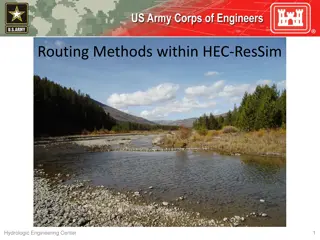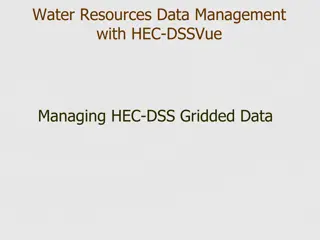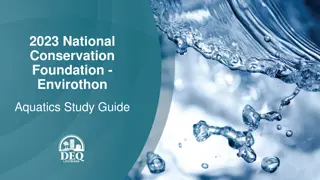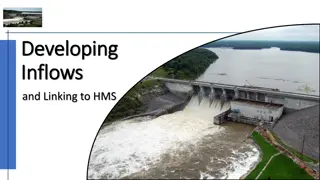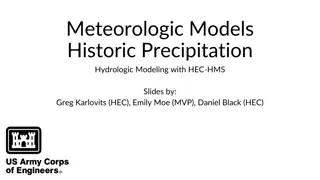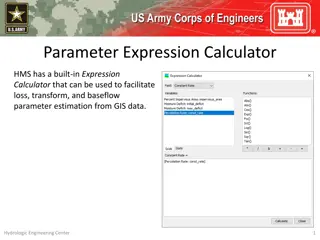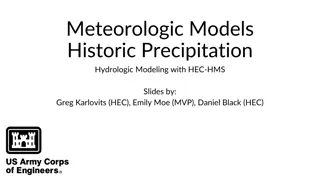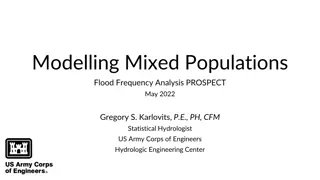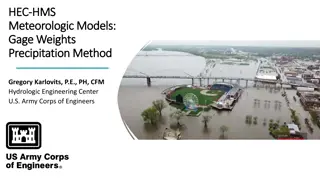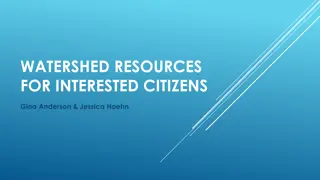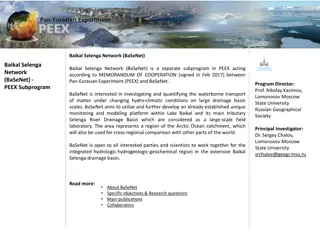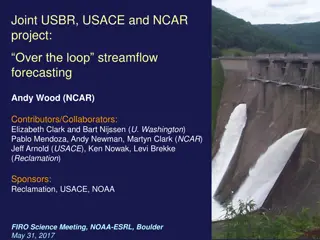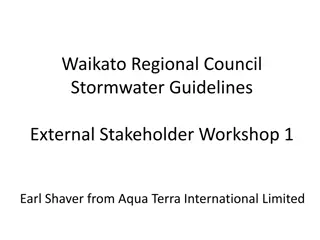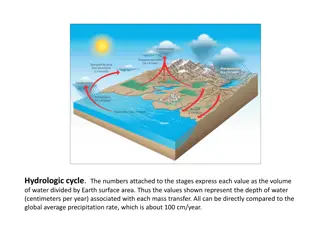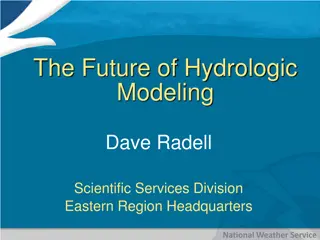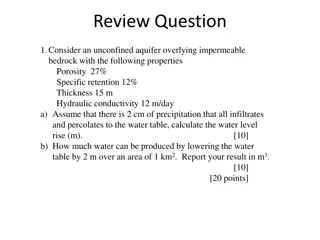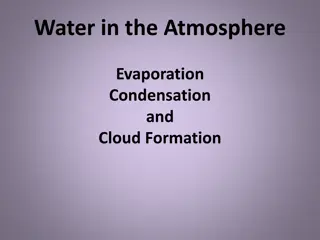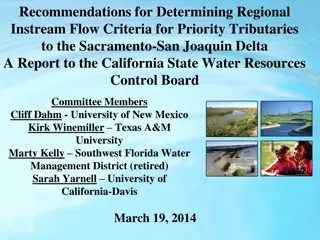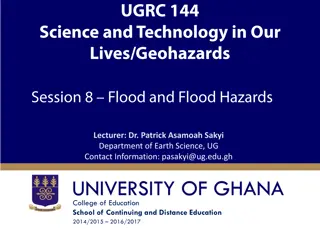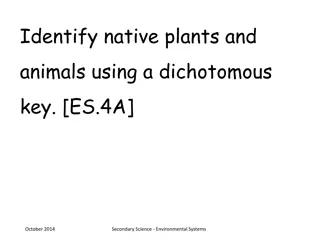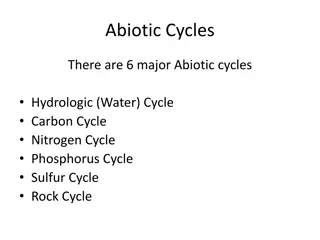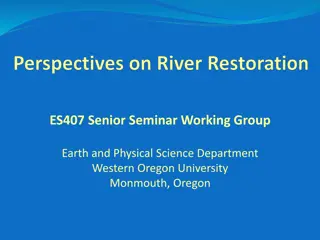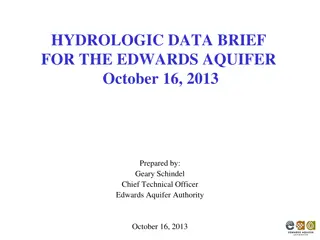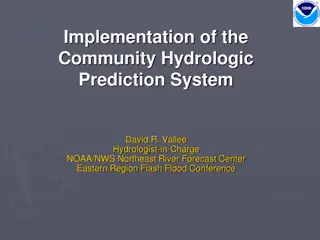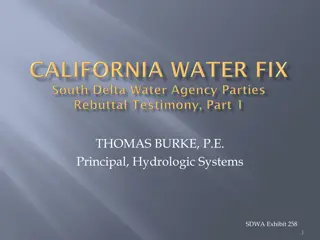Hydrologic Modeling Methods in HEC-HMS: A Comprehensive Overview
Explore the transformative methods within HEC-HMS hydrologic modeling, including unit hydrograph derivation, excess precipitation transformation, hydrograph illustration, surface transform methods, and concepts like the kinematic wave and 2D diffusion wave. Learn about the unit hydrograph, kinematic
2 views • 41 slides
Analyzing Hydrologic Time-Series for Flood Frequency Analysis
This content delves into the methods and assumptions involved in studying hydrologic time-series data for flood frequency analysis. It covers topics such as different types of assumptions, including independence and persistence, and highlights how streamflow data can be analyzed to find annual maxim
7 views • 97 slides
Understanding Routing Methods in Hydrologic Engineering Center (HEC-ResSim)
Explore the differences between hydrologic and hydraulic routing, learn about open channel flow processes, and delve into channel routing within HEC-ResSim. Discover various reach routing methods, parameter estimation techniques, and calibration approaches. Dive into the Muskingum method and its app
6 views • 29 slides
Managing Water Resources Data with HEC-DSSVue
Learn about managing gridded data in HEC-DSSVue, including how grids represent spatial data, storing data in DSS, naming conventions, tools for manipulation, and more. Explore the importance of grids in hydrologic modeling and the application of spatial data in HEC-HMS and HEC-RAS.
4 views • 42 slides
Stochastic Storm Transposition in HEC-HMS: Modern Techniques and Applications
Explore the innovative methods and practical applications of Stochastic Storm Transposition (SST) in the context of HEC-HMS. Delve into the history, fundamentals, simulation procedures, and benefits of using SST for watershed-averaged precipitation frequency analysis. Learn about the non-parametric
3 views • 41 slides
Understanding Adverse Events Following Immunization (AEFI)
Adverse Events Following Immunization (AEFI) are medical incidents that occur after immunization, potentially caused by the vaccine, leading to unfavorable symptoms. Pharmacovigilance plays a crucial role in detecting, assessing, and preventing these events. AEFI can impact immunization programs at
4 views • 40 slides
2023 National Conservation Foundation - Envirothon
Explore the intricate dynamics of aquatic ecosystems and wetlands conservation through this comprehensive study guide. Discover the importance of watersheds, the hydrologic cycle, aquatic food webs, energy flow at trophic levels, and common macroinvertebrates in Louisiana. Learn about different wetl
3 views • 27 slides
GIS Data Management in Hydrologic Engineering Center (HEC) Software
Efficiently manage GIS data in HEC software by organizing background shapefiles, saving files in relevant directories, and utilizing relative pathnames. Understand the contents of basin files, GIS directories, and the step-by-step process involved in the delineation of elements within a project.
9 views • 5 slides
Understanding Extreme Value Theory in Civil Engineering
Introduction to Extreme Value Theory (EVT) in civil engineering focusing on the analysis of extremes such as shear strength, slope stability, and load factors. The theory, exemplified by Emil Julius Gumbel, questions the likelihood of individual observations falling outside expected distributions. E
10 views • 49 slides
Understanding Reservoir Inflows and Computing Methods
Explore the methods for computing reservoir inflows, including mass balance formulas, known and unknown variables, and techniques to handle negative values. Learn about linking to HMS for hydrologic engineering, estimating local inflows, and utilizing smoothing techniques for accurate results.
0 views • 24 slides
Hydrologic Modeling with Gridded Precipitation Data
Learn about utilizing gridded precipitation data for hydrologic modeling with HEC-HMS. Explore the advantages of spatially distributed precipitation sources such as RADAR and gauge comparisons, and understand the various national and regional products available. Discover utilities for converting and
3 views • 14 slides
Parameter Expression Calculator for Efficient Parameter Estimation from GIS Data
Parameter Expression Calculator within HEC-HMS offers a convenient tool to estimate loss, transform, and baseflow parameters using GIS data. It includes various options such as Deficit and Constant Loss, Green and Ampt Transform, Mod Clark Transform, Clark Transform, S-Graph, and Linear Reservoir. U
2 views • 5 slides
Understanding Probability in Events
Explore concepts of probability in various events like rolling a die, compound events, simple events, and spinner probability. Learn how to calculate probabilities of different outcomes and understand the difference between single and compound events. Discover key principles in probability theory an
0 views • 13 slides
Historic Precipitation Hydrologic Modeling with HEC-HMS Slides by Greg Karlovits, Emily Moe, Daniel Black
Delve into the world of hydrologic modeling with HEC-HMS through a detailed presentation by experts Greg Karlovits, Emily Moe, and Daniel Black. Explore meteorologic models, atmospheric boundary conditions, basin modeling, and simulation runs in this informative slide series.
0 views • 12 slides
Understanding Mixed Populations in Flood Frequency Analysis
In this presentation by Gregory S. Karlovits, P.E., PH, CFM, a statistical hydrologist from the US Army Corps of Engineers, the focus is on modelling mixed populations in flood frequency analysis. The key topics include revisiting the IID assumption, identifying mixed populations, and building model
0 views • 38 slides
Understanding Gage Weights and Precipitation Methods in Hydrologic Modeling
Exploring the concept of gage weights and precipitation methods in hydrologic modeling using the HEC-HMS software. Dive into the pros and cons of flexible gage weighting, calibration processes, and best practices for estimating time and depth weights. Discover how to set up a gage weights model, inc
0 views • 11 slides
Guide to Participating in STAR Events in Georgia FCCLA
Discover the significance of STAR Events in Georgia FCCLA, competitive events acknowledging proficiency in various projects, leadership, and career readiness. Learn how to select individual or team events, choose a suitable project, and initiate your project effectively. Empower yourself to excel in
0 views • 19 slides
Watershed Resources for Interested Citizens
Explore a variety of resources related to watersheds, wetlands, and water monitoring, including tools provided by the U.S. Fish and Wildlife Services National Wetland Inventory. Learn about different types of wetlands, access the Indiana Watershed Group Finder for locating hydrologic unit codes, and
3 views • 18 slides
Baikal Selenga Network (BaSeNet) - Hydrologic Research Program in PEEX
Baikal Selenga Network (BaSeNet) is a subprogram under PEEX focusing on studying waterborne matter transport in the Lake Baikal and Selenga River Drainage Basin. The program aims to quantify hydro-climatic impacts on large scales, utilizing a monitoring and modeling platform. Research objectives inc
0 views • 5 slides
Engineering Hydrology Course Overview and Great Salt Lake Evaporation Analysis
Engineering Hydrology course led by David Tarboton covers principles of hydrology, water balance concepts, and hydrologic modeling. The analysis of Great Salt Lake evaporation explores factors such as inflow, area, and precipitation to determine the average annual evaporation rate.
1 views • 18 slides
Over-the-Loop Streamflow Forecasting Project Summary
Joint project by USBR, USACE, and NCAR focusing on improving streamflow forecasting using automated over-the-loop approaches. Key challenges include model calibration, data assimilation, and real-time forcings. Objectives involve building an automated system for short- to long-term flow predictions
0 views • 41 slides
Waikato Regional Council Stormwater Guidelines Workshop Overview
The Waikato Regional Council organized an external stakeholder workshop to discuss their new stormwater guidelines, aiming to provide consistent hydrologic design practices in the region. The workshop highlighted the importance of a council-specific guideline, changes from TP 108, allowance for alte
0 views • 20 slides
Understanding the Hydrologic Cycle and Water Distribution
The hydrologic cycle, water distribution in the hydrosphere, water usage in the United States in 2005, condensation processes forming fog, cloud types, precipitation processes including ice-crystal and coalescence processes, and types of precipitation like sleet, freezing rain, hail, and graupel are
1 views • 30 slides
Advancements in Hydrologic Modeling for Enhanced Predictions
Explore the future of hydrologic modeling with a focus on distributed models, data assimilation, ensemble forecasts, and verification. Discover the potential benefits of continued research in physically based models for more accurate forecasts in various conditions. Uncover challenges facing hydrolo
0 views • 23 slides
RMS PTO Board Meeting Update and Event Schedule
The recent RMS PTO board meeting covered various topics such as budget tracking, upcoming events, and recent activities. Discussions included PayPal usage, budget allocations for future fundraisers, expenses, and a review of recent events. The meeting also outlined an array of events planned for the
0 views • 7 slides
Hydrogeology and Water Resource Management Problems
The content contains four challenging problems related to hydrogeology, evaporation, watershed hydrology, and flood control reservoir operations. It covers topics such as water table rise, evaporation rate calculation, unit hydrograph analysis, detention basin filling, and reservoir inflow routing.
0 views • 4 slides
Understanding Probability of Compound Events
Compound events involve multiple outcomes occurring together, such as independent events where one outcome does not affect another, and dependent events where one outcome affects the other. Complement sets, card probabilities, and mutually exclusive events are also discussed, providing a comprehensi
0 views • 15 slides
Understanding the Hydrologic Cycle and Water in the Atmosphere
Exploring the intricate processes of evaporation, condensation, and cloud formation in the atmosphere, the hydrologic cycle's closed system, and the impact of global warming on Earth's water resources. Dive into the essential concepts of water absorption, redistribution of energy, humidity, and the
0 views • 18 slides
Recommendations for Establishing Instream Flow Criteria in Priority Tributaries
This report explores the significance of preserving instream flows in priority tributaries to the Sacramento-San Joaquin Delta and provides recommendations for determining regional instream flow criteria. Key points include the importance of flow regimes in maintaining biological integrity and the d
0 views • 11 slides
Enhancing Flow Opportunities in Scott Valley Groundwater Study
The Scott Valley Groundwater Study identifies flow enhancement opportunities to improve water management and increase stream flows. Initiatives include developing an integrated hydrologic model, exploring water management strategies, and implementing groundwater recharge projects since 2008. The stu
0 views • 6 slides
Understanding the Hydrological Cycle and Flood Hazards
This session with Dr. Patrick Asamoah Sakyi delves into the hydrologic cycle, causes of flooding, and ways to mitigate flood hazards. Topics covered include the hydrologic cycle, stream systems, flood consequences, factors affecting flood severity, and strategies for reducing flood risks. Recommende
0 views • 37 slides
Exploring Ecosystem Dynamics: Environmental Systems Study
In this Environmental Systems study, students delve into identifying native plants and animals using a dichotomous key, assessing their roles within local ecosystems, and comparing them to other biomes. They also analyze abiotic cycles such as rock, hydrologic, carbon, and nitrogen cycles, and evalu
0 views • 40 slides
Understanding Abiotic Cycles in Ecosystems: Hydrologic, Carbon, Nitrogen, and More
Abiotic cycles play a crucial role in regulating ecosystems. The hydrologic cycle involves processes like evaporation, condensation, precipitation, and transpiration. The carbon cycle relies on photosynthesis, respiration, and human activities like deforestation and burning fossil fuels. The nitroge
0 views • 20 slides
River Restoration Strategies in Oregon: ES407 Senior Seminar Working Group
Explore the efforts of the ES407 Senior Seminar Working Group from Western Oregon University in Monmouth as they delve into river restoration strategies, watershed assessment, salmonid habitat restoration, fluvial hydrology, and more. Discover the historical framework shaping modern interventions an
0 views • 7 slides
Hydrologic Data Brief for the Edwards Aquifer - October 16, 2013
Hydrological data report for the Edwards Aquifer on October 16, 2013, covering current water levels, spring flows, long-term changes, well readings, and spring discharges. The report includes trends over the last 10 days, deviations from historical averages, and water level updates for various wells
0 views • 11 slides
Noise Control Measures and Community Preferences at the Corn Exchange
Various images and references discuss the history of amplified music events at the Corn Exchange, noise complaints leading to control methods by the FTC, impacts on events and community preferences post-control, and survey findings on participant demographics, noise effects, and desired public event
0 views • 19 slides
Implementation of the Community Hydrologic Prediction System
The Community Hydrologic Prediction System (CHPS) is a revolutionary initiative replacing the outdated NWS River Forecast System. It aims to improve hydrologic modeling infrastructure by incorporating modern forecasting concepts and models, enhancing data sharing, and fostering collaboration within
0 views • 15 slides
Hydrologic Systems Analysis for Water Quality Assessment
Principals Thomas Burke and Operations Impacts in the Hydrologic Systems exhibit a comprehensive analysis of scenarios and comparison between Preferred Alternative (PA) and No Action Alternative (NAA). The assessment covers river stage reductions, channel siltation, and the impact on water quality i
0 views • 21 slides
Brain Oxygen Optimization in Severe TBI: Adverse Events Analysis
This study led by Dr. Robert Silbergleit focuses on adverse events in brain oxygen optimization for severe Traumatic Brain Injury (TBI) patients. It outlines key points for reporting adverse events, discusses relatedness algorithms, and presents scenarios to analyze adverse events occurrence post-en
0 views • 24 slides
Official Kayaking Rules for Michigan Events
Official rules for kayaking events in Michigan including information on events offered, uniforms, equipment requirements, and general rules for athletes. Athletes can enter up to three events but must choose between Traditional or Unified events. The rules cover attire, required equipment such as li
0 views • 14 slides


